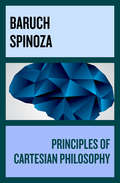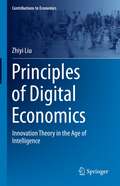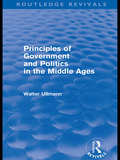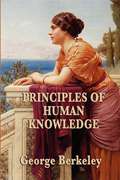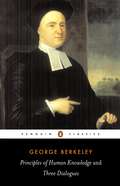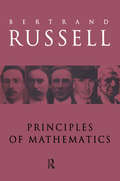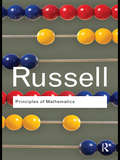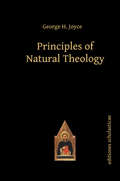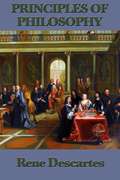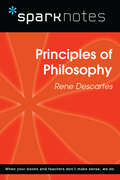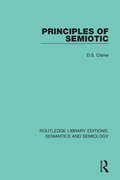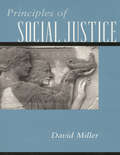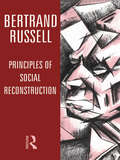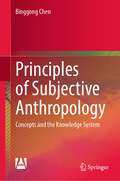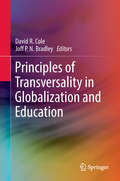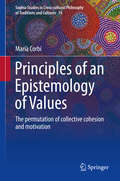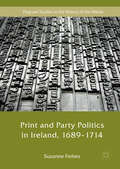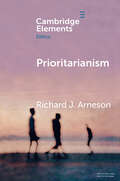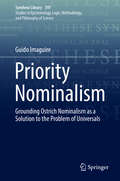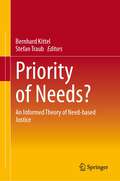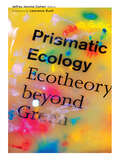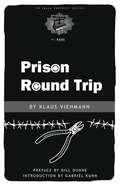- Table View
- List View
Principles of Cartesian Philosophy: With Metaphysical Thoughts And Lodewijk Meyer's Inaugural Dissertation
by Baruch SpinozaThis book provides depth and insight into the philosophical doctrine of Rene Descartes, and compares it to the metaphysics of Spinoza himself.
Principles of Cartesian Philosophy: With Metaphysical Thoughts And Lodewijk Meyer's Inaugural Dissertation
by Baruch SpinozaThis book provides depth and insight into the philosophical doctrine of Rene Descartes, and compares it to the metaphysics of Spinoza himself.
Principles of Digital Economics: Innovation Theory in the Age of Intelligence (Contributions to Economics)
by Zhiyi LiuThis book aims to "digital economics" as an inter-discipline research area, by integrating economics, philosophy of technology, computer science and sociology. It takes an in-depth look at the history of technology development covering the changes and challenges to the society and thoughts, as it is, which helps readers to understand the logic and operation of the emerging integrated economy. Also a lot of innovation cases in digital transformation of China are presented in this book.
Principles of Government and Politics in the Middle Ages (Routledge Revivals: Walter Ullmann on Medieval Political Theory)
by Walter UllmannIn many respects this book, first published in 1961, marked a somewhat radical departure from contemporary historical writings. It is neither a constitutional nor a political history, but a historical definition and explanation of the main features which characterised the three kinds of government which can be discerned in the Middle Ages – government by the Pope, the King, the People. The author’s enviable knowledge of the sources – clerical, secular, legal, constitutional, liturgical, literary – as well as of modern literature enables him to demonstrate the principles upon which the papal government, the royal government, and the government of the people rested. He shows how the traditional theocratic forms of government came to be supplanted by forms of government based on the will of the people. Although concerned with the Middle Ages, the book also contains much that is of topical interest to the discerning student of modern institutions. Medieval history is made understandable to modern man by modern methods.
Principles of Human Knowledge
by George BerkeleyThrough reflection or introspection, is it possible to attempt to know if a sound, shape, movement, or color can exist unperceived by a mind? This book largely seeks to refute the claims made by Berkeley's contemporary John Locke about the nature of human perception. Both Locke and Berkeley agreed that there was an outside world, and it was this world which caused the ideas one has within one's mind. Berkeley sought to prove that the outside world was also composed solely of ideas.
Principles of Human Knowledge and Three Dialogues
by George BerkeleyOne of the greatest British philosophers, Bishop Berkeley (1685-1753) was the founder of the influential doctrine of Immaterialism - the belief that there is no reality outside the mind, and that the existence of material objects depends upon their being perceived. The Principles of Human Knowledge eloquently outlines this philosophical concept, and argues forcefully that the world consists purely of finite minds and ideas, and of an infinite spirit, God. A denial of all non-spiritual reality, Berkeley's theory was at first heavily criticized by his contemporaries, who feared its ideas would lead to scepticism and atheism. The Three Dialogues provide a powerful response to these fears.
Principles of Mathematics
by Bertrand RussellPublished in 1903, this book was the first comprehensive treatise on the logical foundations of mathematics written in English. It sets forth, as far as possible without mathematical and logical symbolism, the grounds in favour of the view that mathematics and logic are identical. It proposes simply that what is commonly called mathematics are merely later deductions from logical premises. It provided the thesis for which Principia Mathematica provided the detailed proof, and introduced the work of Frege to a wider audience.In addition to the new introduction by John Slater, this edition contains Russell's introduction to the 1937 edition in which he defends his position against his formalist and intuitionist critics.
Principles of Mathematics (Routledge Classics)
by Bertrand RussellFirst published in 1903, Principles of Mathematics was Bertrand Russell’s first major work in print. It was this title which saw him begin his ascent towards eminence. In this groundbreaking and important work, Bertrand Russell argues that mathematics and logic are, in fact, identical and what is commonly called mathematics is simply later deductions from logical premises. Highly influential and engaging, this important work led to Russell’s dominance of analytical logic on western philosophy in the twentieth century.
Principles of Natural Theology
by George JoyceNatural theology is that branch of philosophy that investigates what human reason, unaided by revelation, can tell us concerning God. The end at which it aims is to demonstrate the existence of God, to establish the principal divine attributes, to vindicate God's relation to the world as that of the Creator to the creature, and, finally, to throw what light it can on the action of divine providence in regard to man and on the problem of evil.
Principles of Philosophy
by Rene DescartesJack London (January 12, 1876 - November 22, 1916), was an American author who wrote The Call of the Wild and other books. A pioneer in the then-burgeoning world of commercial magazine fiction, he was one of the first Americans to make a huge financial success from writing.The Scarlet Plague was written by Jack London and originally published in London Magazine in 1912. It was re-released in February of 2007 by Echo Library. The story takes place in 2072, sixty years after the scarlet plague has depopulated the planet. James Howard Smith is one of the few people left alive in the San Francisco area, and as he realizes his time grows short, he tries to impart the value of knowledge and wisdom to his grandsons.American society at the time of the plague has become severely stratified and there is a large hereditary underclass of servants and "nurses;" and the politcal system has been replaced by a formalized oligarchy. Commercial airship lines exist, as do some airships privately owned by the very rich.
Principles of Philosophy (SparkNotes Philosophy Guide)
by SparkNotesPrinciples of Philosophy (SparkNotes Philosophy Guide) Making the reading experience fun! SparkNotes Philosophy Guides are one-stop guides to the great works of philosophy–masterpieces that stand at the foundations of Western thought. Inside each Philosophy Guide you&’ll find insightful overviews of great philosophical works of the Western world.
Principles of Semiotic (Routledge Library Editions: Semantics and Semiology)
by David S. ClarkeFirst published in 1987, this book is an attempt to re-establish semiotic on the basis of principles consistent with its past history, rather than the ‘cultural semiotics’ of the European tradition, and especially with the guiding ideas of Peirce and Morris. The book is divided into two parts, with the first two chapters providing the background for the more systematic discussions of signs at different levels taken up in the last three. In the final chapter issues that have become the focus of recent philosophy of language regarding the reference, meaning, and truth of sentences are discussed in light of the analogies to more primitive signs developed in the preceding two chapters.
Principles of Social Justice
by David MillerDeveloping a new theory for social justice, David Miller, in this book, argues that principles of justice must be understood contextually, with each principle finding its natural home in a different form of human association.
Principles of Social Justice
by David MillerSocial justice has been the animating ideal of democratic governments throughout the twentieth century. Even those who oppose it recognize its potency. Yet the meaning of social justice remains obscure, and existing theories put forward by political philosophers to explain it have failed to capture the way people in general think about issues of social justice. This book develops a new theory. David Miller argues that principles of justice must be understood contextually, with each principle finding its natural home in a different form of human association. Because modern societies are complex, the theory of justice must be complex, too. The three primary components in Miller's scheme are the principles of desert, need, and equality. The book uses empirical research to demonstrate the central role played by these principles in popular conceptions of justice. It then offers a close analysis of each concept, defending principles of desert and need against a range of critical attacks, and exploring instances when justice requires equal distribution and when it does not. Finally, it argues that social justice understood in this way remains a viable political ideal even in a world characterized by economic globalization and political multiculturalism. Accessibly written, and drawing upon the resources of both political philosophy and the social sciences, this book will appeal to readers with interest in public policy as well as to students of politics, philosophy, and sociology.
Principles of Social Reconstruction
by Bertrand RussellThis book, originally entitled Why Men Fight, is generally seen as the fullest expression of Russell's political philosophy. Russell argues that after the experience of the Great War the individualistic approach of traditional liberalism has reached its limits. Political theory must be based on the motivated forces of creativity and impulse rather than on competition. Both are best fostered in the family, in education, and in religion - each of which Russell proceeds to discuss. The ideas expressed in Principles of Social Reconstruction have greatly contributed to Russell's fame as a social critic and anti-war activist. The new introduction by Richard Rempel locates them in the context of Russell's other writings and show that neither his ideas nor his language have lost their force and topicality over the years.
Principles of Subjective Anthropology: Concepts and the Knowledge System
by Binggong ChenThis book puts forward the concept of “subjective anthropology” and outlines a theoretical system that will allow subjective anthropology to qualify as a new academic discipline in its own right. In an effort to respond to the field’s proper role as the science of humanity, subjective analysis has been introduced into the study of anthropology. The book fills two distinct gaps in our knowledge and understanding of modern man, offering detailed descriptions of personality and of groups, while also advancing the theory of “structure and choice.” The book formulates seven basic principles of subjective anthropology and divides anthropology into three major branches: subjective anthropology, cultural anthropology, and biological (or physical) anthropology, which can be further divided into sub-branches. The book pursues three key goals: advancing and developing the theoretical system of subjective anthropology, reconstructing the discipline of anthropology, and establishing a Chinese anthropology with Chinese characteristics, Chinese visions, and Chinese styles.
Principles of Transversality in Globalization and Education
by David R. Cole Joff P.N. BradleyThis unique book comprehensively covers the evolving field of transversality, globalization and education, and presents creative, research-based thought experiments that seek to unravel the forces of globalization impacting education. Pursuing various approaches to and uses of transversality, with a focus on the ideas of Félix Guattari, it is the only book of its kind. Specifically, it examines the influence of Guattari at the forefront of educational research that addresses, enhances and sets free activist micro-perspectives, which can counter macro-global movements, such as capitalism and climate change. This book is a global education research text that includes perspectives from four continents, providing a balanced and significant work on globalization in education.
Principles of an Epistemology of Values
by Marià CorbíThis book addresses the need to create an "axiological epistemology". This term refers to knowledge of what is axiological, i. e. everything related to human values, and the know-how on how to manage the study of values. In knowledge societies, we know and live axiological projects that we do not receive from anyone, but that we must construct ourselves in a situation of continuous change. In view of the fact that the axiological crisis in which we are immersed is the most serious one that humanity has suffered over its long history, the seriousness and urgency of the issue in question is evident. Adequate knowledge is required to solve this problem, which is at the root of all the problems we are experiencing. This work offers a potential solution that, in contrast to the past, cannot be definitive, but must be transformed throughout the continuous changes to ways of life as a result of technoscience. It will prove of great value to all those who must operate within human values and motivate groups, as well as to those interested in spirituality.
Print and Party Politics in Ireland, 1689-1714 (Palgrave Studies in the History of the Media)
by Suzanne ForbesThis book is the first full-length study of the development of Irish political print culture from the Glorious Revolution of 1688-9 to the advent of the Hanoverian succession in 1714. Based on extensive analysis of publications produced in Ireland during the period, including newspapers, sermons and pamphlet literature, this book demonstrates that print played a significant role in contributing to escalating tensions between tory and whig partisans in Ireland during this period. Indeed, by the end of Queen Anne’s reign the public were, for the first time in an Irish context, called upon in printed publications to make judgements about the behaviour of politicians and political parties and express their opinion in this regard at the polls. These new developments laid the groundwork for further expansion of the Irish press over the decades that followed.
Prioritarianism (Elements in Ethics)
by Richard J. ArnesonPrioritarianism holds that improvements in someone's life (gains in well-being) are morally more valuable, the worse off the person would otherwise be. The doctrine is impartial, holding that a gain in one person's life counts exactly the same as an identical gain in the life of anyone equally well off. If we have some duty of beneficence to make the world better, prioritarianism specifies the content of the duty. Unlike the utilitarian, the prioritarian holds that we should not only seek to increase human well-being, but also distribute it fairly across persons, by tilting in favor of the worse off. A variant version adds that we should also give priority to the morally deserving – to saints over scoundrels. The view is a standard for right choice of individual actions and public policies, offering a distinctive alternative to utilitarianism (maximize total well-being), sufficiency (make everyone's condition good enough) and egalitarianism (make everyone's condition the same).
Priority Nominalism: Grounding Ostrich Nominalism as a Solution to the Problem of Universals (Synthese Library #397)
by Guido ImaguireThis monograph details a new solution to an old problem of metaphysics. It presents an improved version of Ostrich Nominalism to solve the Problem of Universals. This innovative approach allows one to resolve the different formulations of the Problem, which represents an important meta-metaphysical achievement.In order to accomplish this ambitious task, the author appeals to the notion and logic of ontological grounding. Instead of defending Quine’s original principle of ontological commitment, he proposes the principle of grounded ontological commitment. This represents an entirely new application of grounding.Some metaphysicians regard Ostrich Nominalism as a rejection of the problem rather than a proper solution to it. To counter this, the author presents solutions for each of the formulations. These include: the problem of predication, the problem of abstract reference, and the One Over Many as well as the Many Over One and the Similar but Different variants.This book will appeal to anyone interested in contemporary metaphysics. It will also serve as an ideal resource to scholars working on the history of philosophy. Many will recognize in the solution insights resembling those of traditional philosophers, especially of the Middle Ages.
Priority of Needs?: An Informed Theory of Need-based Justice
by Bernhard Kittel Stefan TraubThis book develops an empirically informed normative theory of need-based justice, summarizing core findings of the DFG research group FOR2104 “Need-based Justice and Distributive Procedures”. In eleven chapters scholars from the fields of economics, political science, philosophy, psychology, and sociology cover the identification and rationale of needs, the recognition and legitimacy of needs, the dynamics and stability of procedures of distributions according to needs, and the consequences and sustainability of need-based distributions. These four areas are studied from the perspective of two mechanisms of need objectification, the social objectification by the discursive generation of mutual understanding (transparency) and the factual objectification by the transfer of decisions to uninvolved experts (expertise). The volume addresses academics in the fields of justice research, ethics, political theory, social choice and welfare, framing, individual and group decision making, inequality and redistribution, as well as advanced students in the contributing disciplines.
Prismatic Ecology: Ecotheory beyond Green
by Jeffrey Jerome CohenEmphasizing sustainability, balance, and the natural, green dominates our thinking about ecology like no other color. What about the catastrophic, the disruptive, the inaccessible, and the excessive? What of the ocean&’s turbulence, the fecundity of excrement, the solitude of an iceberg, multihued contaminations? Prismatic Ecology moves beyond the accustomed green readings of ecotheory and maps a colorful world of ecological possibility.In a series of linked essays that span place, time, and discipline, Jeffrey Jerome Cohen brings together writers who illustrate the vibrant worlds formed by colors. Organized by the structure of a prism, each chapter explores the coming into existence of nonanthropocentric ecologies. &“Red&” engages sites of animal violence, apocalyptic emergence, and activism; &“Maroon&” follows the aurora borealis to the far North and beholds in its shimmering alternative modes of world composition; &“Chartreuse&” is a meditation on postsustainability and possibility within sublime excess; &“Grey&” is the color of the undead; &“Ultraviolet&” is a potentially lethal force that opens vistas beyond humanly known nature.Featuring established and emerging scholars from varying disciplines, this volume presents a collaborative imagining of what a more-than-green ecology offers. While highlighting critical approaches not yet common within ecotheory, the contributions remain diverse and cover a range of topics including materiality, the inhuman, and the agency of objects. By way of color, Cohen guides readers through a reflection of an essentially complex and disordered universe and demonstrates the spectrum as an unfinishable totality, always in excess of what a human perceives.Contributors: Stacy Alaimo, U of Texas at Arlington; Levi R. Bryant, Collin College; Lowell Duckert, West Virginia U; Graham Harman, American U in Cairo; Bernd Herzogenrath, Goethe U of Frankfurt; Serenella Iovino, U of Turin, Italy; Eileen A. Joy; Robert McRuer, George Washington U; Tobias Menely, Miami U; Steve Mentz, St. John&’s U, New York City; Timothy Morton, Rice U; Vin Nardizzi, U of British Columbia; Serpil Oppermann, Hacettepe U, Ankara; Margaret Ronda, Rutgers U; Will Stockton, Clemson U; Allan Stoekl, Penn State U; Ben Woodard; Julian Yates, U of Delaware.
Prison Round Trip (PM Pamphlet)
by Gabriel Kuhn Klaus Viehmann Bill DunnePrison Round Trip is a reflection on prison life and how to keep one's sanity and political integrity behind bars. Grappling with themes of consciousness, the nature of freedom, and what it means to be alive, Klaus Viehmann wrote this essay ten years after being released from prison, having completed a 15-year sentence for his involvement in urban guerrilla activities in Germany. The preface by political prisoner Bill Dunne, held by the U.S. government for over thirty years now, shows that the nature of imprisonment, and the ways in which the human spirit can transcend it, are universal.
Prisoners of Reason
by S. m. AmadaeIs capitalism inherently predatory? Must there be winners and losers? Is public interest outdated and free-riding rational? Is consumer choice the same as self-determination? Must bargainers abandon the no-harm principle? Prisoners of Reason recalls that classical liberal capitalism exalted the no-harm principle. Although imperfect and exclusionary, modern liberalism recognized individual human dignity alongside individuals' responsibility to respect others. Neoliberalism, by contrast, views life as ceaseless struggle. Agents vie for scarce resources in antagonistic competition in which every individual seeks dominance. This political theory is codified in non-cooperative game theory; the neoliberal citizen and consumer is the strategic rational actor. Rational choice justifies ends irrespective of means. Money becomes the medium of all value. Solidarity and good will are invalidated. Relationships are conducted on a quid pro quo basis. However, agents can freely opt out of this cynical race to the bottom by embracing a more expansive range of coherent action.
